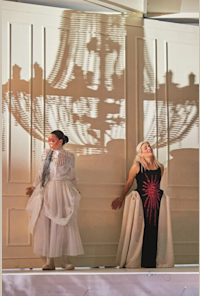

Electra by Strauss, Fra (2023/2024), I regi av Nina Russi, Dirigent Enrico Calesso, Gabor Hontvári, Theaterfabrik Blaue Halle, Würzburg, Germany
Produsent
Conductor
EC(2023 okt. 08, 11, 22, 31; nov. 22; des. 01)
GH(2023 okt. 15; 2024 jan. 07)
Stage director
Cast
Elektra
(Electra)
Chrysothemis
IP(2023 okt. 15, 22, 31; nov. 22; des. 01; 2024 jan. 07)

(2023 okt. 08, 11)
Klytämnestra
(Klytaemnestra)

(2023 okt. 08, 11, 15, 22, 31; nov. 22)
MB(2023 des. 01; 2024 jan. 07)
Orest
Aegisth
Der Pfleger des Orest
(Orest's tutor)
Die Vertraute
(The confidante)
Die Schleppträgerin
(The trainbearer)

(2023 okt. 08, 11, 15, 22, 31; nov. 22; des. 01)
JA(2024 jan. 07)
Ein junger Diener
(A young servant)
Ein alter Diener
(An old servant)
Die Aufseherin
(The overseer)
Erste Magd
(First maid)
Zweite Magd
(Second maid)
Dritte Magd
(Third maid)
HI(2023 okt. 08, 11, 15, 31; nov. 22; des. 01)
MM(2023 okt. 22; 2024 jan. 07)
Vierte Magd
(Fourth maid)

(2023 okt. 08, 11, 15, 22, 31; nov. 22; des. 01)
JA(2024 jan. 07)
Fünfte Magd
(Fifth maid)
SH(2023 okt. 08, 31; nov. 22; des. 01)
MK(2023 okt. 15, 22; 2024 jan. 07)
Mannskap
Set designer
Costume designer
Lighting designer
Chorus master
Dramaturge
Répétiteur



